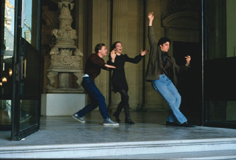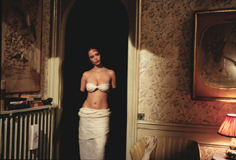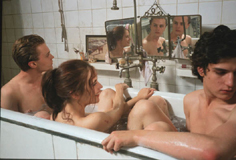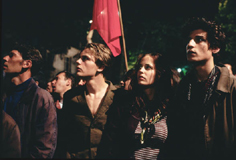The Dreamers (Bernardo Bertolucci, 2003)
 Above all, The Dreamers once again reaffirms the fact that Bertolucci is
a remarkable visual storyteller. Even though there is a moment or two in its
script that makes me wince, there's little denying that the movie has much more
to offer than mere words. In this intense chamber drama,
set almost entirely in one French apartment during the volatile spring of 1968,
not only does the director avoid repeating his images, but also manages to make
them suggest depths of character that the script scarcely hints at. Take for
example the ravishing image a young woman stripped naked, standing in the shadow
of a cross. In this instance, Bertolucci promises redemption that the characters
don’t yet realize they need. She is exposing herself, presumably to titillate
the two men in the room, but at the same time her actions, and Bertolucci’s
framing of them, reveal her inner motivations to us.
Above all, The Dreamers once again reaffirms the fact that Bertolucci is
a remarkable visual storyteller. Even though there is a moment or two in its
script that makes me wince, there's little denying that the movie has much more
to offer than mere words. In this intense chamber drama,
set almost entirely in one French apartment during the volatile spring of 1968,
not only does the director avoid repeating his images, but also manages to make
them suggest depths of character that the script scarcely hints at. Take for
example the ravishing image a young woman stripped naked, standing in the shadow
of a cross. In this instance, Bertolucci promises redemption that the characters
don’t yet realize they need. She is exposing herself, presumably to titillate
the two men in the room, but at the same time her actions, and Bertolucci’s
framing of them, reveal her inner motivations to us.
 Much has been made of The
Dreamers’ sexual content, but it’s clear in moments like these that the
drama not only would be less exciting without nudity; it almost wouldn’t exist
at all. Bertolucci literally strips his actors bare early on, and soon any shock
value or titillating moments pass, leaving in their stead an unusual degree of
intimacy. It’s at that point that the director is free to truly confront the
audience with the workings of his bizarre love triangle. In every shot, whether
by framing a character spying on another from a distance or each of them
disturbingly reflected up close in a bathtub, his camera reminds us of the
shifting dynamics between his characters. In this magnified atmosphere, the
seemingly silly rituals of sex and film trivia that they present to each other
take on overtones that are positively ritualistic.
Much has been made of The
Dreamers’ sexual content, but it’s clear in moments like these that the
drama not only would be less exciting without nudity; it almost wouldn’t exist
at all. Bertolucci literally strips his actors bare early on, and soon any shock
value or titillating moments pass, leaving in their stead an unusual degree of
intimacy. It’s at that point that the director is free to truly confront the
audience with the workings of his bizarre love triangle. In every shot, whether
by framing a character spying on another from a distance or each of them
disturbingly reflected up close in a bathtub, his camera reminds us of the
shifting dynamics between his characters. In this magnified atmosphere, the
seemingly silly rituals of sex and film trivia that they present to each other
take on overtones that are positively ritualistic.
 The three central characters in The
Dreamers clearly see the world in cinematic terms, which is a surprisingly
rare trait in movies. I love how they are able to find in the cinema a set of
moral standards – a clip from Freaks demonstrates their sense of
camaraderie as much as one from Mouchette demonstrates a sense of moral
consequence or Marlene Dietrich’s Blonde Venus song and dance routine
keys them into the exoticism of sex. Individually, these references feel a bit
too coy, but when taken as a whole, a worldview begins to emerge. Of course,
it’s the cloistering aspect of cinema that encourages the worst sorts of
infantile behavior in these ultimately immature young adults. The glory, and the
trap, of great cinema is that one can quite easily mistake it for real world
experience. As the title suggests, the three young protagonists in this movie
are intentionally chasing after a dream promised by the cinema instead of facing
the mounting realities of the real world.
The three central characters in The
Dreamers clearly see the world in cinematic terms, which is a surprisingly
rare trait in movies. I love how they are able to find in the cinema a set of
moral standards – a clip from Freaks demonstrates their sense of
camaraderie as much as one from Mouchette demonstrates a sense of moral
consequence or Marlene Dietrich’s Blonde Venus song and dance routine
keys them into the exoticism of sex. Individually, these references feel a bit
too coy, but when taken as a whole, a worldview begins to emerge. Of course,
it’s the cloistering aspect of cinema that encourages the worst sorts of
infantile behavior in these ultimately immature young adults. The glory, and the
trap, of great cinema is that one can quite easily mistake it for real world
experience. As the title suggests, the three young protagonists in this movie
are intentionally chasing after a dream promised by the cinema instead of facing
the mounting realities of the real world.
 Though Bertolucci is capable of
making us understand how intelligent young people could get pulled into this
world in the opening scenes, as the movie proceeds, both the sexual escapades
between the trio and their willingness to shut themselves off from the political
and practical world that surround them begin to inspire more and more
queasiness. That
strange mixture of knowing that you are doing wrong, yet not being pushed to a
point where you have to change your behavior is captured so well here, and, when
the time came, I found it moving how political involvement symbolically absolves
the characters of their sins. At the same time, however, the film is aware that
one impossible dream might only be replacing another. Bertolucci is too smart to
either embrace his characters wholeheartedly or damn them for their solipsism.
By time the ending of The Dreamers rolls, what seems to be an almost
random coupling of setting and character violently dovetails into a wakeup call
that demands the idyllic, but harmfully self-absorbed lifestyle that we’ve
observed come to an end.
Though Bertolucci is capable of
making us understand how intelligent young people could get pulled into this
world in the opening scenes, as the movie proceeds, both the sexual escapades
between the trio and their willingness to shut themselves off from the political
and practical world that surround them begin to inspire more and more
queasiness. That
strange mixture of knowing that you are doing wrong, yet not being pushed to a
point where you have to change your behavior is captured so well here, and, when
the time came, I found it moving how political involvement symbolically absolves
the characters of their sins. At the same time, however, the film is aware that
one impossible dream might only be replacing another. Bertolucci is too smart to
either embrace his characters wholeheartedly or damn them for their solipsism.
By time the ending of The Dreamers rolls, what seems to be an almost
random coupling of setting and character violently dovetails into a wakeup call
that demands the idyllic, but harmfully self-absorbed lifestyle that we’ve
observed come to an end.
68
02-14-04
Jeremy
Heilman